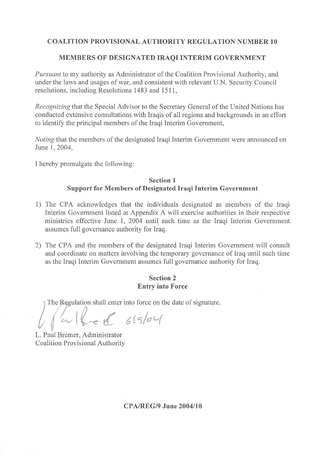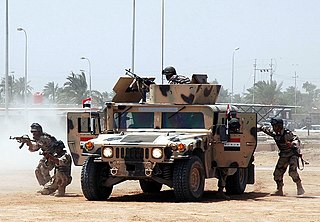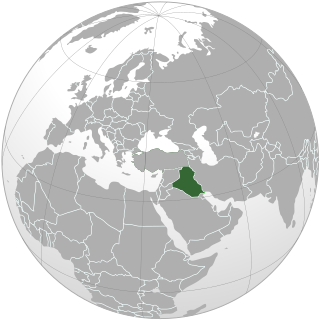
United Nations Security Council resolution 1546, adopted unanimously on 8 June 2004, after reaffirming previous resolutions on Iraq, the Council endorsed the formation of the Iraqi Interim Government, welcomed the end of the occupation and determined the status of the multinational force and its relationship with the Iraqi government.

United Nations Security Council Resolution 1700, adopted unanimously on August 10, 2006, after recalling previous resolutions on Iraq, particularly resolutions 1500 (2003), 1546 (2004), 1557 (2004) and 1619 (2005), the Council extended the mandate of the United Nations Assistance Mission in Iraq (UNAMI) for a further period of twelve months until August 10, 2007.

United Nations Security Council Resolution 1723, adopted unanimously on November 28, 2006, after recalling previous resolutions on Iraq, the Council extended the mandate of the multinational force until the end of 2007.

The United Nations Assistance Mission for Iraq (UNAMI) was formed on 14 August 2003 by United Nations Security Council (UNSC) Resolution 1500 at the request of the Iraqi government to support national development efforts.

United Nations Security Council Resolution 1936, adopted unanimously on August 5, 2010, after recalling all previous resolutions on the situation in Iraq, including resolutions 1500 (2003), 1546 (2004), 1557 (2004), 1619 (2005), 1700 (2006), 1770 (2007), 1830 (2008) and 1883 (2009), the Council extended the mandate of the United Nations Assistance Mission in Iraq (UNAMI) for a further period of 12 months, until July 31, 2011.

United Nations Security Council resolution 1557, adopted unanimously on 12 August 2004, after reaffirming previous resolutions on Iraq, particularly resolutions 1500 (2003) and 1546 (2004), the Council extended the mandate of the United Nations Assistance Mission in Iraq (UNAMI) for a further period of twelve months. The resolution was drafted by the United Kingdom and United States.

United Nations Security Council resolution 1619, adopted unanimously on 11 August 2005, after reaffirming previous resolutions on Iraq, particularly resolutions 1500 (2003), 1546 (2004) and 1557 (2004), the Council extended the mandate of the United Nations Assistance Mission in Iraq (UNAMI) for a further period of twelve months.

United Nations Security Council Resolution 2001, adopted unanimously on July 28, 2011, after recalling all previous resolutions on the situation in Iraq, including resolutions 1500 (2003), 1546 (2004), 1557 (2004), 1619 (2005), 1700 (2006), 1770 (2007), 1830 (2008), 1883 (2009) and 1936 (2010), the Council extended the mandate of the United Nations Assistance Mission in Iraq (UNAMI) for a further period of 1 year.

The United Nations Support Mission in Libya (UNSMIL) is a United Nations (UN) advanced mission in Libya, created in the aftermath of the Libyan Civil War. UNSMIL is a political mission, not a military mission. The main elements of its mandate defined by the UN include supporting Libyan transitional authorities in "post-conflict efforts", providing mediation in implementing Libyan political agreements, supporting key Libyan institutions and monitoring and reporting on human rights. UNSMIL is led by the UN Department of Political Affairs.

United Nations Security Council Resolution 2009 was unanimously adopted on 16 September 2011.

United Nations Security Council Resolution 1830 was unanimously adopted on 7 August 2008.

United Nations Security Council Resolution 2008 extended the mandate of the United Nations Mission in Liberia (UNMIL) for one year, until 30 September 2011. It was unanimously adopted on 16 September 2011.
United Nations Security Council Resolution 1743 was unanimously adopted on 15 February 2007.
United Nations Security Council Resolution 1770 was unanimously adopted on 10 August 2007.
United Nations Security Council Resolution 1880 was unanimously adopted on 30 July 2009.

United Nations Security Council Resolution 1814 was unanimously adopted on 15 May 2008. The resolution called for the United Nations to provide economic, political and technical support to Somalia, with a possible UN peacekeeping force.
United Nations Security Council Resolution 1892 was unanimously adopted on 13 October 2009.
United Nations Security Council Resolution 1826 was unanimously adopted on 29 July 2008.
United Nations Security Council Resolution 1840 was unanimously adopted on 14 October 2008.

United Nations Security Council Resolution 2110 is a United Nations Security Council resolution adopted unanimously by the United Nations Security Council on 24 July 2013, extending the United Nations Assistance Mission for Iraq until 31 July 2014 as stipulated in several previous resolutions The resolution signaled its intention to review the original mandate, as stipulated in UNSC resolution 2061 within twelve months.












